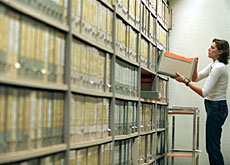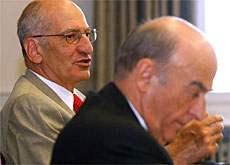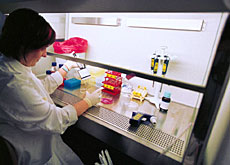Tax vote faces little opposition

A proposal on extending the federal authorities’ right to levy taxes is one of the least contentious issues facing voters on November 28.
Yet the SFr30 billion ($26 billion) raised through direct tax and VAT forms nearly two-thirds of the annual revenue of the federal authorities.
The vote is required as the federal authorities’ current mandate to levy taxes runs out at the end of 2006.
“It is a peculiarity of our country that Swiss voters from time to time have to approve the tax situation,” said Finance Minister Hans-Rudolf Merz.
A clause in the Swiss constitution gives the federal state only a limited mandate to raise taxes. Any change or renewal has to be discussed by parliament and approved in a nationwide vote.
The restriction is seen as a reflection of the federal system that grants the country’s 26 cantons a large degree of autonomy, including the right to levy taxes of their own.
Confidence
Merz is confident of winning the vote at the end of the month, as there has been virtually no organised opposition.
“There is a great stability and continuity in our system of taxation. Everybody is equally happy – or unhappy – and it seems everybody wants to continue in the same way,” he told swissinfo.
Parliament had voted unanimously in favour of extending the mandate after proposals to enshrine federal tax raising powers in law were brushed aside.
Analysts say the outcome of the nationwide poll is therefore a foregone conclusion.
But Merz says that in the long run certain fiscal reforms are needed for Switzerland to keep its competitive edge among industrialised countries.
Main source of income
The government, parliament and all major political parties agree that the revenue from direct taxes and Value Added Tax (VAT) is crucial for the federal authorities.
“We accept that the federal government needs to ensure its future finances,” said Toni Bortoluzzi, a parliamentarian for the rightwing Swiss People’s Party.
The two taxes make up 63 per cent of federal income, or about SFr30 billion annually.
The remainder comes from taxes on fuel, tobacco and capital gains, as well as stamp duty on financial transactions.
Rates
Current VAT rates are expected to remain unchanged. Regular VAT on goods and services stands at 7.6 per cent with a reduced rate of 2.4 per cent.
The Swiss hotel industry continues to benefit from a controversial rate of 3.6 per cent following a decision by parliament in June 2003.
This is the eighth time since 1950 that the Swiss electorate has been asked to decide on a limited extension of the federal government mandate to levy taxes.
Under the Swiss fiscal system, each of the country’s 26 cantons, the local authorities and the federal government raise taxes.
swissinfo, Urs Geiser
Direct federal taxes and VAT make up 63%, or about SFr30 billion ($26 billion) of the federal authorities’ annual revenue.
VAT stands at 7.6%, with a reduced rate for the tourism industry of 3.6%.
Voters will have the final say on a proposal to extend the right of the federal authorities to levy taxes, including VAT, until 2020.
Parliament gave unanimous approval to the proposal, and it has met with no organised opposition.
Switzerland has a three-tier system of federal, cantonal and local taxes, thanks to federalism.

In compliance with the JTI standards
More: SWI swissinfo.ch certified by the Journalism Trust Initiative



You can find an overview of ongoing debates with our journalists here. Please join us!
If you want to start a conversation about a topic raised in this article or want to report factual errors, email us at english@swissinfo.ch.